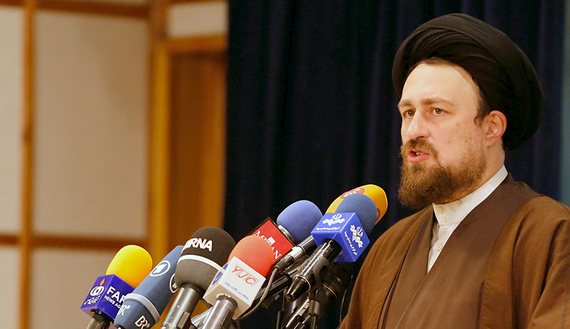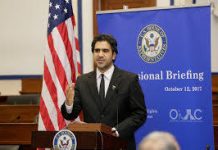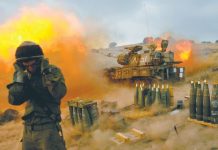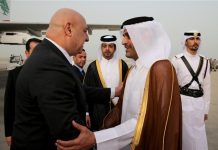Congress sets up first showdown of the year over Iran deal
Julian Pecquet/Al-Monitor/January 07/16
The Obama administration tells Al-Monitor that it “strongly opposes” an Iran sanctions bill that is scheduled for an initial vote this week, setting the scene for the first of what promises to be a long list of showdowns over Iran policy in 2016.The House Foreign Affairs Committee on Jan. 7 is set to mark up legislation from Rep. Steve Russell, R-Okla., that would restrict the administration’s ability to lift sanctions on Iranian financial institutions as called for under the Iran deal. Administration officials say the bill is a transparent attempt to derail the Joint Comprehensive Plan of Action (JCPOA).
“We’re aware of this draft legislation, and as we have long said, we are opposed to any legislation that interferes with the implementation of the JCPOA,” a senior administration official told Al-Monitor via email. “From what we have seen of this bill, it would interfere with the implementation of the JCPOA, and therefore, the administration strongly opposes it.”
The bill would require the administration to certify that Iranian financial institutions have not knowingly helped fund Iran’s Islamic Revolutionary Guard Corps, foreign terrorist organizations and several other entities before they can be removed from the Treasury Department’s list of specifically designated nationals. The Iran deal requires that the United States cease its nuclear-related sanctions on those banks as part of its obligations under Annex II of the deal. “It means that we can’t do the deal,” said Richard Nephew, a former principal deputy coordinator for sanctions policy at the State Department, now with Columbia University’s Center on Global Energy Policy. “I think it’s written with the deliberate intention of making it such that we cannot delist the banks that are supposed to be delisted.”
The committee counters that the bill’s goal is to “ensure the administration does not lift sanctions against individuals involved in Iran’s ballistic missiles program or terrorism,” according to a markup schedule. Republicans — and not a few Democrats — are incensed at the administration’s failure to sanction Iran for recent missile launches and have vowed to do all they can to keep punishing Iran for its support for terrorism and other activities. “We’ve ended up with the president negotiating a deal here which has to be enforced now,” committee chairman Ed Royce, R-Calif., told reporters in a year-end press conference last month before leaving town for the holidays. “And we don’t see the intention at this point on the part of the administration with respect to a will to enforce. And this will be a key issue next year.”
The procedure and timing of this week’s action, just days into the new year, suggests deal skeptics are scrambling to try to tie the administration’s hands before sanctions are lifted on implementation day, which could happen as soon as this month. Sanctions bills are typically worked out between Royce and his Democratic counterpart, New York Rep. Eliot Engel, but in this case the bill being marked up was introduced by a committee outsider (Russell sits on the armed services and oversight panels) and hasn’t been endorsed by a single Democrat — or even by Royce himself.
“It’s disappointing, but I suspect the Republican leadership came down from high,” Engel told Al-Monitor. “This is not a serious attempt. This is an attempt to play partisan politics with a very serious issue, and I don’t want to be a part of that.”Russell’s bill is theoretically retroactive — it would apply to President Barack Obama’s actions going back to July 19 — but it’s not clear that would survive a challenge by the administration. The congressman’s office told Al-Monitor that he hopes to get a floor vote on the bill shortly; no companion bill has yet been introduced in the Senate.
“Congressman Russell has been working with leadership on the timing of this bill, and we hope to see it come to the floor soon,” a Russell spokesman said via email. Advocates of the Iran deal say some of the financial entities that are supposed to get relief under the deal were sanctioned specifically because of their ties to some of the actors designated by Russell’s bill, making the certification impossible. The bill “would effectively bar the president from lifting sanctions on Iranian banks in ways that would contradict US obligations under the JCPOA,” Tyler Cullis of the pro-deal National Iranian American Council argues in an email to Al-Monitor. “It would do so by mandating the president to certify that the Iranian banks had not provided financial services to designated Iranian entities, despite the fact that such banks were themselves designated for precisely doing such.”
Cullis also raises concerns with a section of the bill that would give lawmakers the ability to review — and potentially void — administration licenses for the export of certain products to Iran.
“Some in Congress have grown concerned over the powers currently enjoyed by President Obama to lift sanctions on Cuba and Iran and signaling their intent to limit those powers in future,” he told Al-Monitor. “This provision would allow Congress an effective veto over any presidential modifications to the US’s trade embargo with Iran, which highlights the serious concern by Iran hawks that the nuclear agreement foreshadows a broader rapprochement between the US and Iran.”Nephew predicted such bills will keep popping up even after implementation day.
”I fully expect that there will be challenges to the JCPOA by skeptics in Congress for the entire life of the JCPOA,” he said. “Are they trying to tie [the president’s] hands? Sure. Will they be trying to tie his hands in a couple of months? Sure. This is the life we now lead.”
Tehran’s smog problem unlikely to clear up anytime soon
Mahmoud Pargoo/Al-Monitor/January 07/16
Taghi Ebtekar, a lecturer at the University of Tehran and head of the Environmental Protection Organization of Iran from 1980 to 1981, was among the first academics to address the problem of Tehran’s air pollution back in the 1970s. His daughter, Masoumeh Ebtekar, the current head of Iran’s Environmental Protection Organization, is continuing his struggle — but with no signs of success in the near future. While the elder Ebtekar consulted with the mayor of Tehran in 1975 to persuade him to recognize the significance of air pollution for the health and well-being of citizens, the younger Ebtekar may lose her career over the urgency of this issue, which causes the deaths of thousands of Iranians every year.The issue of air pollution was first addressed in the Statute for Preventing Air Pollution in July 1975. After the 1979 Islamic Revolution and during the Iran-Iraq War of 1980-1988, the issue was not taken seriously, as it was overshadowed by arguably more pressing priorities. In 2001, the 10-year Comprehensive Program to Decrease Air Pollution in Tehran (CPDAPT) passed. CPDAPT focused on improving environmental standards in Iran’s auto industry, the renovation of the aging vehicles on the streets, increasing access to public transportation, upgrading the quality of fuel and executing compulsory safety and environmental inspections of vehicles. In 2005, the Comprehensive Plan for Transportation and Traffic of Tehran (CPTTT) was introduced, with a special focus on decreasing air pollution. The CPTTT included initiatives such as increasing the green belt around main roads, the development of more pedestrian pathways in the business districts of Tehran, the introduction of hybrid taxis and the levying of new council taxes on low-standard vehicles. Some 11 years after the introduction and partial execution of the CPTTT and other initiatives, air pollution still kills thousands of people in Tehran annually. If anything, things have never been as bad as they’ve been this winter. So what is standing in the way of a more effective solution to this pressing problem?
For one thing, Tehran’s air pollution is partly due to geographical factors: The Iranian capital is semi-enclosed by high altitude mountains in three directions, blocking air circulation. Tehran makes up a quarter of the Iranian economy. Its population increased from 1.8 million in 1956 to more than 8 million in 2011, where it has roughly stayed. Meanwhile, the number of cars in Iran increased from 1.2 million in 1979 to 17 million in 2014, of which 7 million are roaming the streets of Tehran. The majority of these cars are domestically manufactured, with many of them failing to meet international environmental standards. Adding to this, the sanctions during the past decade have crippled the country’s technological advances in the auto industry and negatively affected fuel quality, among other issues. In sum, the matter of air pollution is a complex problem that is hard to address. Hence, it is no surprise that despite all efforts to reduce pollution in Tehran, the Iranian capital still suffers from this problem.
Moreover, even a cursory glance at Iranian newspapers these days gives away that air pollution has a very strong political component. On Dec. 26, the government-owned Iran Daily published a column describing the measures that metropolises in Western countries have taken to decrease air pollution. A day later, Hamshahri — owned by Tehran municipality — countered with an article about the power of municipalities in those megacities. Indeed, almost all political rivals are either trying to disclaim their respective organization’s responsibility of the problem or accusing their rivals of mismanagement. In short, air pollution is a politicized topic.
Without a doubt, politics are structurally involved in the problem of air pollution. The organizations responsible for taking on the issue are not coordinated and managed under a higher body with superseding control, while the Iranian capital suffers from the effects of centralized management. On the one hand, the mayor of Tehran is selected by the city council, whose members are elected by a public vote every four years. On the other hand, there are various government bodies — including the Environmental Protection Organization, the Oil Ministry and the Ministry of Industry, Mines and Trade — that make decisions that directly impact air quality. There are also other players and competitors; for instance, the authority for traffic lies with the police, which is under the control of the supreme leader.
Tehran’s need for centralized management was brought up several years ago, but it has been overshadowed by the potential risks of the overwhelming political power of the mayor. In this vein, and in relation to air pollution, many political factions oppose giving the mayor more power over the city. This is partly a result of the nature of the duties and responsibilities of Tehran municipality, which is making an effort to explain — perhaps a bit too much — its activities to the public. In addition, the municipality’s public relation tools are diverse and abundant, from public events in thousands of parks and public spaces to cultural centers in almost all districts of Tehran, controlling one of the most important newspapers in the country and so on and so forth. This makes any mayor of Tehran a highly influential person with tools to advance his political agenda, in the past leading to political ascension to the presidency. For instance, current Mayor Mohammad Bagher Ghalibaf has unsuccessfully run for president twice. Ghalibaf’s predecessor, Mahmoud Ahmadinejad, won the presidential election of 2005 after serving as Tehran’s mayor for only two years, during that time gaining such prominence and influence that he managed to take on powerful politicians such as Expediency Council Chairman Ayatollah Ali Akbar Hashemi Rafsanjani and other rivals. Another previous mayor and potential presidential candidate was Gholamhossein Karbaschi, who was later politically neutralized by the conservative-controlled judiciary, which banned him from holding public office for 10 years. In conclusion, Tehran’s complex air pollution problem requires difficult decisions. These decisions may include stopping any new residential and commercial developments, levying high taxes on private car owners in the capital, increasing fuel prices, imposing strict environmental standards on vehicles entering the city, increasing fines for offenders and so on. But none of the responsible organizations are willing to bear the political burdens of such hard — and at times unpopular — decisions. Therefore, the issue appears set to drag on, at least for the near future.
Will missing text message disqualify Khomeini’s grandson?
Arash Karami/Al-Monitor/January 07/16
On Jan. 5, the Assembly of Experts, the body that elects the supreme leader of Iran, held examinations for the candidates who registered to run in the 2016 elections. Of the 531 candidates who registered for the assembly elections, 400 attended the exam. Of the 131 missing from the examination, the most notable was Hassan Khomeini, the most prominent grandson of Ayatollah Ruhollah Khomeini, the founder of the Islamic Republic of Iran.Hassan Khomeini’s absence surprised many, including Reformist and moderate figures and media, who were hoping to use the Khomeini family name to increase their political clout both in the assembly and parliamentary elections. His absence was stranger still because the test was administered in Qom, Iran’s religious center 80 miles south of the capital, a city Khomeini often resides in. According to his family members, Khomeini was never informed of the details regarding the test. Family members said that while the test was being administered, he was teaching a class. They even released a picture on social media showing the young cleric sitting at the center of what looks like a hosseinieh, or religious center, supposedly at the same time of the test.
Family members also denied reports that Khomeini’s absence suggests he is pulling out of the elections. The Guardian Council responded to claims that Khomeini was not informed of the test by saying that all the candidates were sent a text message about the test. They reiterated that no candidates would receive special concessions regarding how they would be informed. Dana website claimed that the Guardian Council had even prepared a special room for Khomeini to take the test, though this was denied by sources close to Khomeini.
The spokesman for the Guardian Council, Nejatollah Ebrahimian, said that missing the test would not automatically disqualify a candidate from running, and that if a candidate wants to pull out of the elections, it has to be put in writing. Nevertheless, he added that if a candidate does not take the test, the Guardian Council is unable to authenticate whether a candidate is qualified to run in the elections. But there are doubts about the text message. Ebrahimian told Etemaad newspaper that the Guardian Council had put out a public statement regarding the test. He said there was no written or personal invitation to take the test. He added that only candidates who have not been approved previously to run in the elections are required to take the test.
Etemaad, a Reformist paper sympathetic toward Khomeini, quoted Dec. 15 comments by Ayatollah Mohammad Momen, a member of the Guardian Council, who said that if a cleric teaches classes and has made public political statements, a religious test is not necessary and there is enough information to judge his qualifications. Conservative media, concerned about the popularity of Khomeini, were quick to exploit his absence from the examination. Even before this round of controversy, on Jan. 3, Mohammad-Ali Mohsen-Zadeh, Supreme Leader Ayatollah Ali Khamenei’s representative to the Islamic Revolutionary Guard Corps’ 41st Sarallah Division, warned that a new sedition was being planned by the family of Ayatollah Khomeini.




















